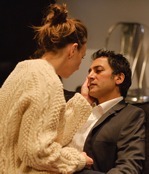SITE GUIDE
SEARCH
REVIEWS
REVIEW ARCHIVES
ADVERTISING AT CURTAINUP
FEATURES
NEWS
Etcetera and
Short Term Listings
LISTINGS
Broadway
Off-Broadway
NYC Restaurants
BOOKS and CDs
OTHER PLACES
Berkshires
London
California
New Jersey
DC
Connecticut
Philadelphia
Elsewhere
QUOTES
TKTS
PLAYWRIGHTS' ALBUMS
LETTERS TO EDITOR
FILM
LINKS
MISCELLANEOUS
Free Updates
Masthead
Writing for Us
A CurtainUp  London Review
London Review
 London Review
London ReviewDisgraced
|
"The mosaics in Andalusia are bending the picture plane four hundred years before Bonnard. That's what I mean. That's what I was saying. The Muslims gave us Aristotle. Without them, we probably wouldn't even have visual perspective."
— Emily
|

Kirsty Bushell as Emily and Hari Dhillon as Amir (Simon Kane)
|
Amir's nephew Abe (Danny Ashok), his name Americanised to disguise his heritage, wants his uncle to speak up in court for an Imam accused of terrorist allegiances. The first scene shows Emily's interest in non-figurative Islamic art inspired by the Spanish Moorish designs at palaces, like the Alhambra. In Scene Two we meet Isaac (Nigel Whitmey) a curator at the Whitney in New York and in a position to promote Emily's career. Scene Three has Isaac and his wife Jory (Sara Powell), a lawyer at the firm where Amir also works and a woman of African American heritage coming to dinner with Amir and Emily.
So Ayab Akhtar has built this portrait of a section of affluent New York society, mixed cultures, mixed religions, mixed ethnicities, unified by their ambition to succeed. Amir is working for a firm with two Jewish partners and it emerges that he has changed his name from the Islamic Abdullah to the Indian sounding Amir Kapoor for reasons associated with 9/11. Amir recalls an incident when his mother found out that his friend at school was a Jewish girl called Rivkah and made her son aware of her feelings about what the Israelis had done to the Palestinians.
As the play progresses there is an over-consumption of alcohol and the cracks start to open up. Amir will feel betrayed by his wife, by his associate Jory and by their friend Isaac and the effect is violent, shocking and destructive. Seething beneath the surface is closet racism and prejudice released by alcohol. Nadia Fall directs well in the traverse space and the performances are believable. Jaimie Todd's design uses the Manhattan apartment space with the trappings of design furniture.
There is a feeling that the character of Emily is dabbling in Islamic art, toying with her husband as if he were a slave, like the subject of Velázquez's painting. “Only for people who are trying to make Islam look all warm and fuzzy, ” says Amir debating whether the Quran says to beat or leave disobedient wives. We are told that Emily was promoting her art career on a visit to London with Isaac, and yet it is her influence in getting Amir to speak up for the Imam in court, which unravels his prospects with the Jewish led law firm. Amir tells us he has rejected his religion, that he is an apostate but the play shows that his culture runs deep and rage is the product.
There are many strands to Ayab Akhtar's interesting play as we seek to analyse what went wrong and what the causes are. Abe, with the idealism of youth, describes the rage felt by Muslims, “For three hundred years they've been taking our land, drawing new borders, replacing our laws, making us want to be like them. Marry their women. They disgraced us. They disgraced us. And then they pretend they don't understand the rage we've got?”
|
Subscribe to our FREE email updates with a note from editor Elyse Sommer about additions to the website -- with main page hot links to the latest features posted at our numerous locations. To subscribe,
E-mail: esommer@curtainup.comesommer@curtainup.com
put SUBSCRIBE CURTAINUP EMAIL UPDATE in the subject line and your full name and email address in the body of the message -- if you can spare a minute, tell us how you came to CurtainUp and from what part of the country. |
| Disgraced
Written by Ayab Akhtar Directed by Nadia Fall Starring: Hari Dhillon, Kirsty Bushell, Danny Ashok, Nigel Whitmey, Sara Powell Designed by Jaimie Todd Sound: Mike Walker Lighting: James Whiteside Fight Director: Kate Waters Running time: One hour 30 minutes without an interval Box Office: 020 8743 5050 Booking to 29nd June 2013 Reviewed by Lizzie Loveridge based on 24th May 2013 at the Bush Theatre The Old Shepherd's Bush Library, 7 Uxbridge Road, London W12 8LJ (Tube: Shepherd's Bush) |
|
REVIEW FEEDBACK Highlight one of the responses below and click "copy" or"CTRL+C"
Paste the highlighted text into the subject line (CTRL+ V): Feel free to add detailed comments in the body of the email . . . also the names and emails of any friends to whom you'd like us to forward a copy of this review. |




